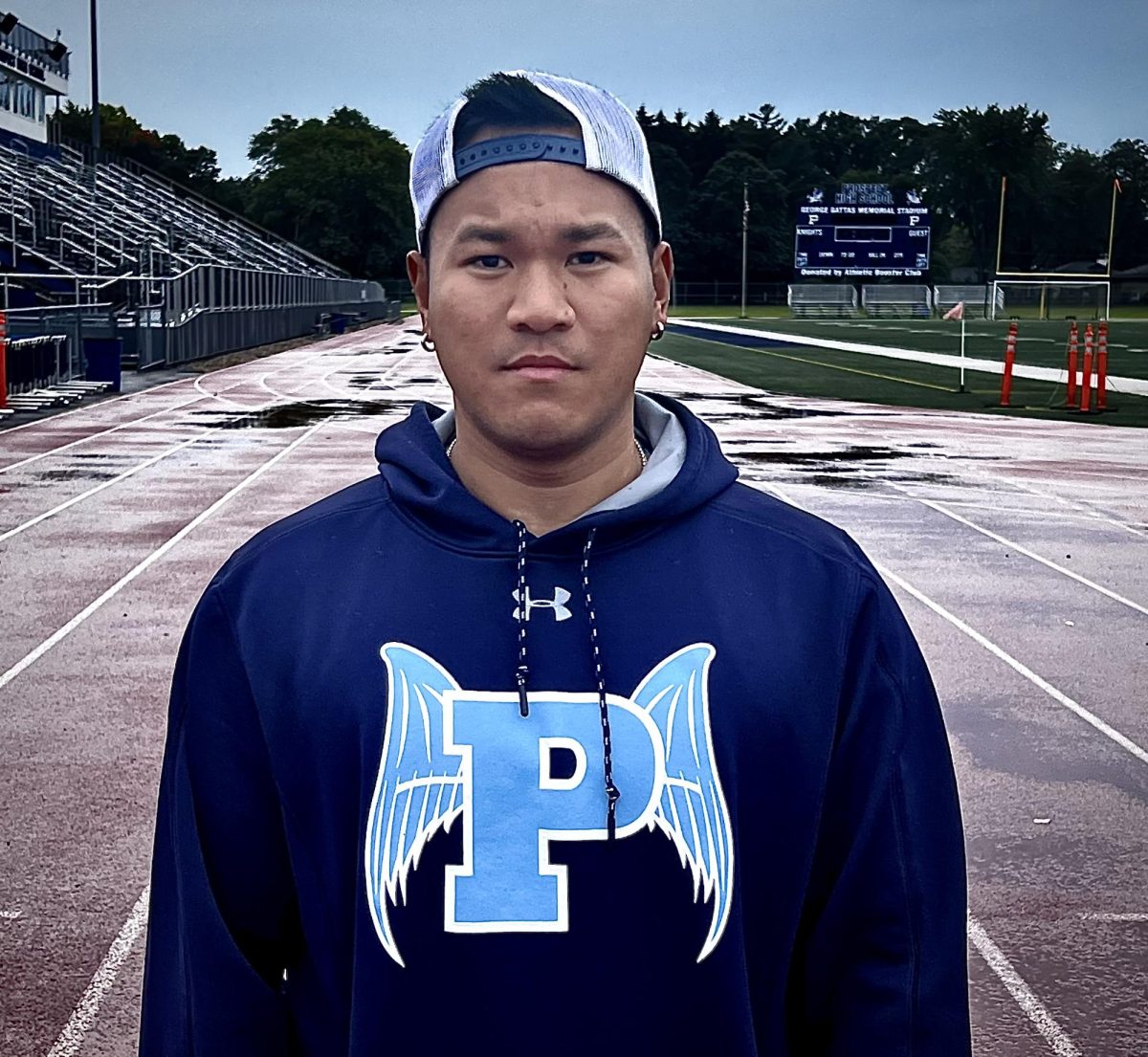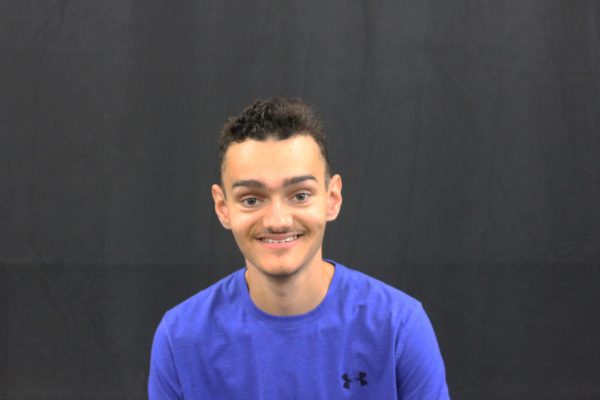The boys cross country athletes, along with coach Jay Renaud, rejoiced in their victory in a dual meet against Conant High School on Tuesday, September 5. The next day, however, the meet left a bittersweet taste in the athletes’ mouths. With all the energy of the meet, they hadn’t realized until then that something — or someone — had been missing. Bryan Quesea, the new assistant coach on the team, was unable to attend the meet because MacArthur Middle School, where Quesea teaches, hosted an open house that same night.
Renaud said the athletes openly admitted that they missed Quesea’s loud, enthusiastic exclamations on the race course, which is the same passion they are used to seeing from him during practice.
“Having a certain energy, having a certain level of, like, ‘I believe in you and this is how excited I am for you’ is the big part, but I don’t think kids necessarily think it’s distracting,” Quesea said. “I think kids really like when the coach is as excited for them as they are.”
“You can tell the kids on the team love [Quesea], and he brings the energy and enthusiasm every single day … he’s yelling in a good way,” Renaud said. You could hear him on that course, and the kids feed off that energy.”
Several years after being separated from Prospect’s program, Quesea is thrilled to return to the school where he ran track before graduating in 2013.
Quesea’s incredible pride for Prospect cross country began when he was just a freshman. After playing a season of soccer, he decided to join the track team as a sprinter. Most of Quesea’s friends were on the distance track team and the cross country team, so during the spring of his freshman year, he decided to abandon soccer and focus on distance track and cross country.
Former cross country coach, Michael Stokes, saw that his potential lay in mid-distance running. Consequently, he recommended that Quesea try the 800 meter. Quesea’s first attempt at the race, however, was not the best, but under Stokes’ guidance, he continued training with the mid-distance athletes.
The new friendships he was able to make on the team instilled his love of running. Those connections followed him for the rest of his life, and he never looked back.
As years passed, Quesea honed his athletic ability and rose up the ranks to varsity, noticing especially big improvements in his 4×800 meter relay. When Quesea first ran the 4×800 as a freshman during the Buffalo Grove Freshman Invite, his time was 3 minutes and 15 seconds. By the end of his first season, his time had plummeted to 2 minutes and 12 seconds, and by his junior year, it was down to 2 minutes and 1 second.
With his own personal gains in high school, Quesea saw so much potential in the cross country and track programs’ ability to improve athletes. That made it clear he wanted to be a coach. After completing his undergraduate’s degree at Illinois State University in 2017, he helped Coach Renaud as a volunteer coach until the COVID-19 pandemic brought Prospect track to a halt in 2020.
Once he completed his master’s degree at Concordia University of Chicago, Quesea took a job offer at Buffalo Grove High School as the head boys cross country coach and the head girls track coach up to and through the 2022 fall season.
Through his experience at Buffalo Grove, Quesea admired the school’s strong recent competitive history. He also knew that an assistant coach role would not earn him as much money as two head coach jobs. Deep down, however, both of these factors were easily trumped by a calling to return to Prospect.
“I loved coaching at Buffalo Grove; I love my teams there, but there’s something special about coming back to a place where you can wear Columbia and Navy again and cheer the Knights on … you can’t really pass up an opportunity to come back to your alma mater and coach a program that means something to you,” Quesea said.
In addition to his experience running at Prospect and coaching at Buffalo Grove, Quesea earned a Level 2 certification in the USA Track and Field (USATF) , the national governing body of all track-and-field events in the United States, by completing a 60-hour certification training course specialized for distance running.
Quesea says it was mostly a biomechanics class that focused on the cellular-level body processes that sustain distance athletes while they are running and the systems of their bodies that are responsible for those processes. The training explained how the cells of an athlete’s body respond at different points in a distance race. All this information was very important for Quesea to understand so he could prescribe not only the best workouts for athletes, but at the precise paces they should be completing those workouts.
In addition to the course that he took, Quesea does a fair amount of studying on his own as well. He and Renaud both own several books about coaching theory and the kinesiology behind running, one of which Quesea keeps on his mantle in his house.
Quesea’s favorite cross country book is “Daniels’ Running Formula,” by Jack Daniels. According to runbundle.com, “Daniels’ Running Formula” is essentially a crash course on how to train oneself to be better at running regardless of one’s ability level. It discusses basic principles to keep in mind when creating a training plan; for example, how to structure a training plan, a few of Daniels’ own training plans he has devised, the uses and benefits of running at different paces and intensities, and how to calculate the training paces that are ideal for a specific individual training for a specific race.
“You learn the logic and the reasoning of … what you do and the reason why you do it and how it gets you faster,” Quesea said. “When you look at old training plans at Prospect, you can line it up to what the other guys are saying; you can combine what you know from a class that you take at USATF and implement that … I think what makes Prospect distance [running training] different is that it’s a combination of a lot of people, a lot of ideas and coaches, and I think that’s really cool,” Quesea said.
While coaching has been a great way for Quesea to apply the knowledge and experience he gained through running and reading, he also finds it to be a fun and relaxing part of his daily routine.
“It’s always nice to unwind after a teaching job and coach, hang out with, [and] mentor kids that have the same interest as you, especially if it’s running … that’s the part I enjoy most,” Quesea said.
For Quesea, another benefit of returning to Prospect is being able to work with Renaud. Quesea worked for him as an assistant coach, coached against him at Buffalo Grove, and ran against Hersey’s team in high school when Renaud was Hersey’s head XC coach. The years’ worth of shared experiences have cultivated a special friendship between the two coaches.
Their familiarity makes Renaud an easy person to collaborate with when deciding on how to structure training plans for the athletes.
“We have a very similar passion for the sport and passion for working with kids,” Renaud said. “ … I feel like he’s a mutual partner in this whole thing with me..”
Quesea and Renaud’s partnership grew further when they met to compare Buffalo Grove’s training plans with Prospect’s training plans over the summer, in an effort to figure out how they could best prepare athletes for the season. It turned out that the two training plans were very similar in their main ideas and purposes.
The minor differences between their training plans were easily settled through compromises and rearranging of workouts, and even now, Renaud and Quesea constantly adjust their plans as they read coaching books and collect research on what colleges around the country’s training plans are.
To Quesea, it makes sense that most of his opinions and beliefs on coaching align with Renaud’s.
“I feel like if you come back to a program that you grew up in, you kind of have that same philosophy as the people that are around you,” Quesea said.
Quesea and Renaud’s core philosophy is to equally value athletes’ physical preparation and their mental strength and perseverance. While maintaining athletes’ physical ability is key to success, Quesea believes the psychological component of cross country matters just as much, if not more, from a coaching standpoint.
“Three miles is a long time you spend with … yourself thinking in your head … getting the kids to dial in, focus, believe in themselves, trust in their work, trust in their fitness, I think that’s more so the preparation in getting kids ready on race day,” Quesea said.
Helping athletes become more confident in their abilities is something Quesea greatly prioritizes in his coaching. Take for example, last July, when he picked senior Owen Smith to win the 1600 meter time trial during Prospect’s Cross Country summer camp. Smith ended up in second place with a time of 4 minutes and 43 seconds.
“I felt pretty good considering I had only done three weeks of training before [the time trial],” Smith said. “I had been out of town and couldn’t run, but I definitely felt like I had more in me, so I was excited to do the 2-mile [time trial] a few weeks later.”
Smith told Quesea he was confident he would win the second time trial. With a few more weeks of training done, Smith felt primed for performance. He ended up winning the time trial, setting a personal 2-mile record of 9 minutes and 48 seconds.
“I didn’t really know [Quesea] for that long, but I felt honored that he had that confidence in me,” Smith said. “I told him [after the time trial], ‘hey, I told you I’d get it next time.’”
Quesea felt inspired by seeing one of his athletes rise to a challenge through effort and perseverance.
“I think that’s the beauty of the sport of running … you can really see kids’ character and how they work when they have to do something that’s really hard … every kid runs the same conditions, every kid has the same distance, and it’s you versus your time … everybody hurts the same,” Quesea said.
With their combined insights and mutual passion for the athletes, Quesea and Renaud have high hopes for the future of the boys cross country program.
“I feel very good about where we’re at now and where we’re gonna head in the future, and I know [Quesea’s] gonna help take this program to even another level with the two of us working together,” Renaud said.





































































